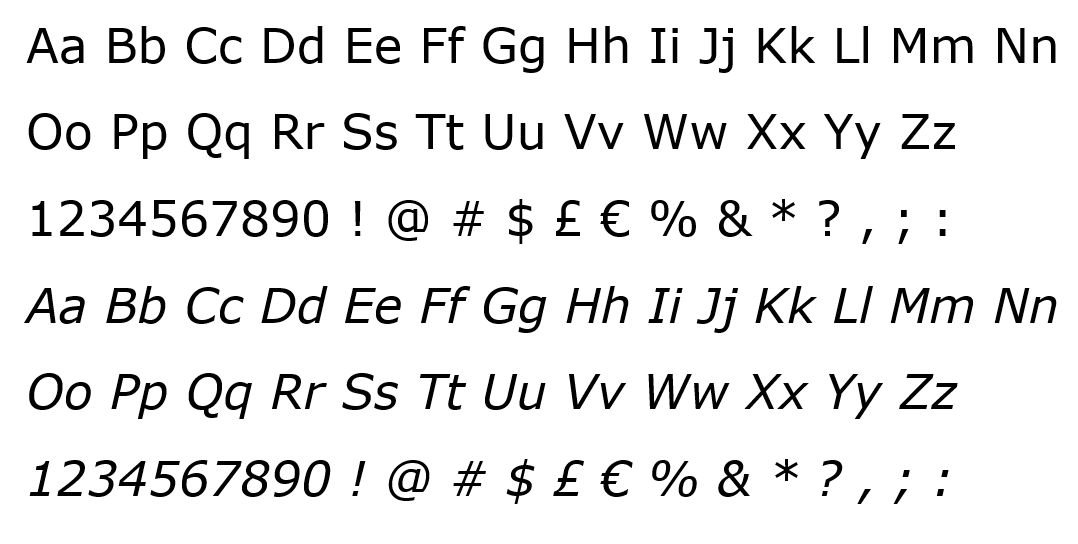Verdana font family
Overview
The Verdana typeface family consists of four TrueType fonts created specifically to address the challenges of on-screen display. Designed by world renowned type designer Matthew Carter, and hand-hinted by leading hinting expert, Agfa Monotype's Tom Rickner, these sans serif fonts are unique examples of type design for the computer screen.
The Verdana family resembles humanist sans serifs such as Frutiger, and Edward Johnston's typeface for the London Underground, and Carter himself claims to see the influence of his own Bell Centennial in the face. But to label Verdana a humanist face is to ignore the fact that this family isn't merely a revival of classical elegance; this is type designed for the medium of screen.
The Verdana fonts exhibit characteristics derived from the pixel rather than the pen, the brush or the chisel. The relationship between straight, curved and diagonal strokes has been painstakingly developed to ensure that the pixel patterns at small sizes are pleasing, clear and legible. Commonly confused characters, such as the lowercase i j l, the uppercase I J L and the numeral 1 have been carefully drawn for maximum distinctiveness - an important characteristic of fonts designed for on-screen use. And the various weights in the typeface family have been designed to create sufficient contrast from one another ensuring, for example, that the bold font is heavy enough even at sizes as small as 8 ppem.
The generous width and spacing of Verdana's characters is key to the legibility of these fonts on the screen. The limited number of pixels available at low resolutions means that tightly set characters can easily clash; turning an r n into an m, or creating distracting black patches in a word. In on-screen typography, it's important to keep the characters distinct from one another, and research has shown that wider letterspacing significantly aids reading from the screen.
The Verdana typeface family was first made available on July 8, 1996. The family is continually being extended to support multilingual needs.
Despite the quality of the Verdana font family at small sizes it is at higher resolutions that the fonts are best appreciated. Some of the subtleties of the letterforms, such as the slightly modulated stroke weight only become truly apparent at larger sizes. In the words of Tom Rickner, "My hope now is that these faces will be enjoyed beyond just the computer screen. Although the screen size bitmaps were the most crucial in the production of these fonts [their] uses should not be limited to on screen typography."
Verdana version history
Version 2.35 - This version of Verdana includes some minor table updates, but no new glyphs.
Version 2.31 - Verdana version 2.31 extends the WGL4 version 2.00 to include the euro currency symbol and Vietnamese language support.
Version 2.10 - This WGL4 (no euro) version of Verdana was added to our Core fonts for the Web on 30 September 1997. It was also supplied with Microsoft Internet Explorer 4.0 which launched on this date. Internet Explorer 3.0 came with Verdana version 1.01.
Version 1.01 - Verdana version 1.01 was added to our Core fonts for the Web on 8 July 1996. It was also supplied with Microsoft Internet Explorer 3.0 released on 13 August 1996.
| Description | |
|---|---|
| File name | Verdana.ttf Verdanab.ttf Verdanaz.ttf Verdanai.ttf |
| Styles & Weights | Verdana Verdana Bold Verdana Bold Italic Verdana Italic |
| Designers | Matthew Carter |
| Copyright | © 2016 Microsoft Corporation. All Rights Reserved. |
| Font vendor | Microsoft Corp. |
| Script Tags | dlng:'Armn', 'Cyrl', 'Grek', 'Latn' slng:'Armn', 'Cyrl', 'Grek', 'Latn' |
| Code pages | 1252 Latin 1 1250 Latin 2: Eastern Europe 1251 Cyrillic 1253 Greek 1254 Turkish 1257 Windows Baltic 1258 Vietnamese Mac Roman Macintosh Character Set (US Roman) |
| Fixed pitch | False |
Licensing and redistribution info
- Font redistribution FAQ for Windows
- License Microsoft fonts for enterprises, web developers, for hardware & software redistribution or server installations
Products that supply this font
| Product name | Font version |
|---|---|
| Windows 11 | See the Windows 11 page. |
| Windows 10 | See the Windows 10 page. |
| Windows 8.1 | See the Windows 8.1 page. |
| Windows 8 | See the Windows 8 page. |
| Windows 7 | See the Windows 7 page. |
| Windows Vista | 5.00 |
| Windows XP | 2.40 |
| Windows 2000 | 2.35 |
| Windows 98 | 2.10 |
| Windows Server 2008 | 5.00 |
| Windows Server 2003 | 2.40 |
This typeface is also available within Office applications. For more information visit this page.
Style & weight examples
